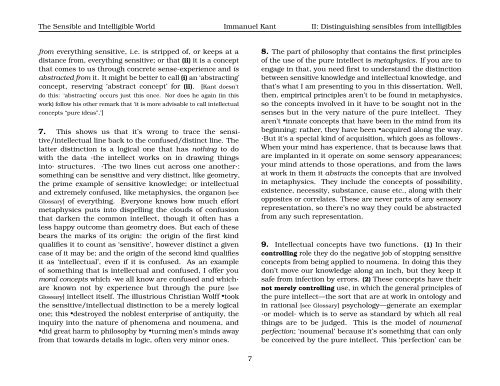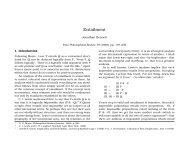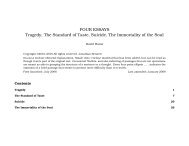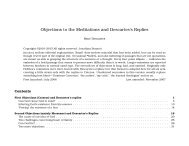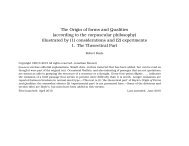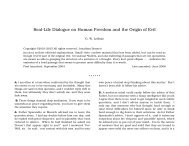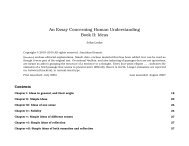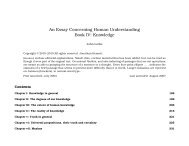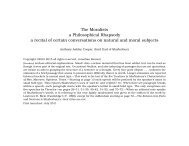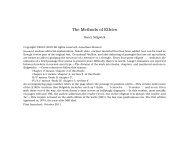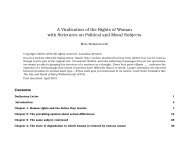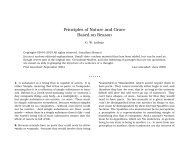The Form and Principles of the Sensible and Intelligible World
The Form and Principles of the Sensible and Intelligible World
The Form and Principles of the Sensible and Intelligible World
Create successful ePaper yourself
Turn your PDF publications into a flip-book with our unique Google optimized e-Paper software.
<strong>The</strong> <strong>Sensible</strong> <strong>and</strong> <strong>Intelligible</strong> <strong>World</strong> Immanuel Kant II: Distinguishing sensibles from intelligibles<br />
from everything sensitive, i.e. is stripped <strong>of</strong>, or keeps at a<br />
distance from, everything sensitive; or that (ii) it is a concept<br />
that comes to us through concrete sense-experience <strong>and</strong> is<br />
abstracted from it. It might be better to call (i) an ‘abstracting’<br />
concept, reserving ‘abstract concept’ for (ii). [Kant doesn’t<br />
do this: ‘abstracting’ occurs just this once. Nor does he again (in this<br />
work) follow his o<strong>the</strong>r remark that ‘it is more advisable to call intellectual<br />
concepts “pure ideas”.’]<br />
7. This shows us that it’s wrong to trace <strong>the</strong> sensitive/intellectual<br />
line back to <strong>the</strong> confused/distinct line. <strong>The</strong><br />
latter distinction is a logical one that has nothing to do<br />
with <strong>the</strong> data ·<strong>the</strong> intellect works on in drawing things<br />
into· structures. ·<strong>The</strong> two lines cut across one ano<strong>the</strong>r·:<br />
something can be sensitive <strong>and</strong> very distinct, like geometry,<br />
<strong>the</strong> prime example <strong>of</strong> sensitive knowledge; or intellectual<br />
<strong>and</strong> extremely confused, like metaphysics, <strong>the</strong> organon [see<br />
Glossary] <strong>of</strong> everything. Everyone knows how much effort<br />
metaphysics puts into dispelling <strong>the</strong> clouds <strong>of</strong> confusion<br />
that darken <strong>the</strong> common intellect, though it <strong>of</strong>ten has a<br />
less happy outcome than geometry does. But each <strong>of</strong> <strong>the</strong>se<br />
bears <strong>the</strong> marks <strong>of</strong> its origin: <strong>the</strong> origin <strong>of</strong> <strong>the</strong> first kind<br />
qualifies it to count as ‘sensitive’, however distinct a given<br />
case <strong>of</strong> it may be; <strong>and</strong> <strong>the</strong> origin <strong>of</strong> <strong>the</strong> second kind qualifies<br />
it as ‘intellectual’, even if it is confused. As an example<br />
<strong>of</strong> something that is intellectual <strong>and</strong> confused, I <strong>of</strong>fer you<br />
moral concepts which ·we all know are confused <strong>and</strong> which·<br />
are known not by experience but through <strong>the</strong> pure [see<br />
Glossary] intellect itself. <strong>The</strong> illustrious Christian Wolff •took<br />
<strong>the</strong> sensitive/intellectual distinction to be a merely logical<br />
one; this •destroyed <strong>the</strong> noblest enterprise <strong>of</strong> antiquity, <strong>the</strong><br />
inquiry into <strong>the</strong> nature <strong>of</strong> phenomena <strong>and</strong> noumena, <strong>and</strong><br />
•did great harm to philosophy by •turning men’s minds away<br />
from that towards details in logic, <strong>of</strong>ten very minor ones.<br />
7<br />
8. <strong>The</strong> part <strong>of</strong> philosophy that contains <strong>the</strong> first principles<br />
<strong>of</strong> <strong>the</strong> use <strong>of</strong> <strong>the</strong> pure intellect is metaphysics. If you are to<br />
engage in that, you need first to underst<strong>and</strong> <strong>the</strong> distinction<br />
between sensitive knowledge <strong>and</strong> intellectual knowledge, <strong>and</strong><br />
that’s what I am presenting to you in this dissertation. Well,<br />
<strong>the</strong>n, empirical principles aren’t to be found in metaphysics,<br />
so <strong>the</strong> concepts involved in it have to be sought not in <strong>the</strong><br />
senses but in <strong>the</strong> very nature <strong>of</strong> <strong>the</strong> pure intellect. <strong>The</strong>y<br />
aren’t •innate concepts that have been in <strong>the</strong> mind from its<br />
beginning; ra<strong>the</strong>r, <strong>the</strong>y have been •acquired along <strong>the</strong> way.<br />
·But it’s a special kind <strong>of</strong> acquisition, which goes as follows·.<br />
When your mind has experience, that is because laws that<br />
are implanted in it operate on some sensory appearances;<br />
your mind attends to those operations, <strong>and</strong> from <strong>the</strong> laws<br />
at work in <strong>the</strong>m it abstracts <strong>the</strong> concepts that are involved<br />
in metaphysics. <strong>The</strong>y include <strong>the</strong> concepts <strong>of</strong> possibility,<br />
existence, necessity, substance, cause etc., along with <strong>the</strong>ir<br />
opposites or correlates. <strong>The</strong>se are never parts <strong>of</strong> any sensory<br />
representation, so <strong>the</strong>re’s no way <strong>the</strong>y could be abstracted<br />
from any such representation.<br />
9. Intellectual concepts have two functions. (1) In <strong>the</strong>ir<br />
controlling role <strong>the</strong>y do <strong>the</strong> negative job <strong>of</strong> stopping sensitive<br />
concepts from being applied to noumena. In doing this <strong>the</strong>y<br />
don’t move our knowledge along an inch, but <strong>the</strong>y keep it<br />
safe from infection by errors. (2) <strong>The</strong>se concepts have <strong>the</strong>ir<br />
not merely controlling use, in which <strong>the</strong> general principles <strong>of</strong><br />
<strong>the</strong> pure intellect—<strong>the</strong> sort that are at work in ontology <strong>and</strong><br />
in rational [see Glossary] psychology—generate an exemplar<br />
·or model· which is to serve as st<strong>and</strong>ard by which all real<br />
things are to be judged. This is <strong>the</strong> model <strong>of</strong> noumenal<br />
perfection; ‘noumenal’ because it’s something that can only<br />
be conceived by <strong>the</strong> pure intellect. This ‘perfection’ can be


